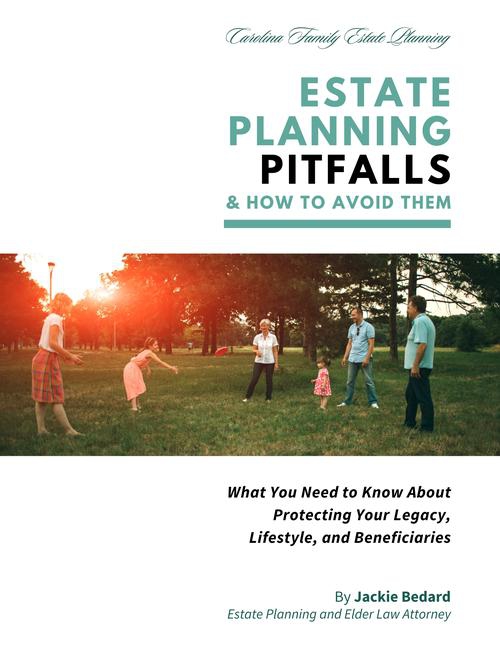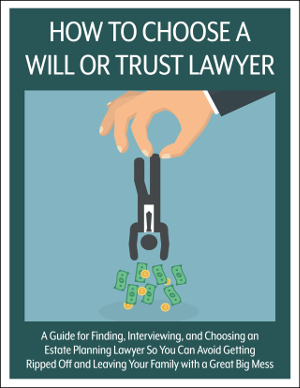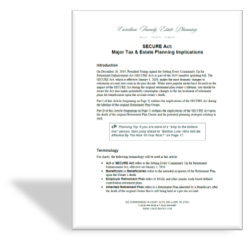
You've worked hard to build your wealth: your home, savings, investments, and perhaps even a business. But without proper planning, these assets can be vulnerable to unforeseen events like lawsuits, creditor claims, or even family disputes. While many believe that a simple will is sufficient, effective asset protection requires a more comprehensive approach. In this article, we detail some smart estate planning moves most people miss.
1. Proper Asset Titling: The Foundation of Protection
How you title your assets affects how they pass to others, and whether they’re exposed to risks. In North Carolina, jointly held property or “tenancy by the entirety” for married couples may offer protection from some individual creditor claims. But many people overlook how titling can unintentionally disinherit someone or expose assets in a divorce. Strategic titling is the first layer of safeguarding what you own.
2. Regularly Update Beneficiary Designations
Accounts like life insurance policies, IRAs, and 401(k)s pass directly to named beneficiaries, regardless of what your will says. That’s why it’s crucial to review your designations after life events like marriage, divorce, or the birth of a child. Mistakes here are common and can lead to major family disputes. Keeping this information current is one of the easiest yet most overlooked ways to keep your plan aligned with your goals.
3. Utilize Trusts for Enhanced Protection
Trusts offer much more than probate avoidance. A revocable living trust can help keep your affairs private and streamline asset distribution. Meanwhile, irrevocable trusts (when crafted properly) can shield assets from certain liabilities, including long-term care expenses. Trusts also give you more control over how and when assets are distributed to your loved ones.
4. Establish Powers of Attorney (POAs)
Having both a financial and healthcare power of attorney means someone you trust can step in if you become incapacitated. Without these in place, your loved ones might have to go through court just to manage your affairs. A solid POA not only protects your assets from mismanagement; it also saves your family from unnecessary stress and legal hurdles.
5. Consider LLCs for Real Estate and Business Assets
Holding real estate or business assets through a Limited Liability Company (LLC) can be a smart estate planning move that many overlook. For real estate investors, especially those managing rental properties, an LLC creates a legal barrier between your personal finances and the potential risks associated with property ownership. If a tenant files a lawsuit for an injury or property-related issue, the claim would typically be limited to the assets owned by the LLC, not your personal savings, home, or other investments.
Additionally, some individuals choose to form Anonymous LLCs in privacy-friendly states like Wyoming or Delaware. These structures can provide an extra layer of confidentiality by keeping ownership details out of public record. While not necessary for everyone, this option may be worth considering for those seeking enhanced privacy or added protection in high-risk professions or public-facing roles.
Beyond protection from liability, LLCs also offer strategic advantages like easier asset transfer to heirs, potential tax flexibility, and a layer of privacy. In North Carolina, setting up and maintaining an LLC is relatively straightforward, but it’s important to keep up with formalities such as separate bank accounts, annual reports, and proper record-keeping. Skipping these details could weaken the LLC’s legal shield.
6. Implement Asset Protection Trusts
Trusts are among the most powerful and flexible tools in estate planning, and when used correctly, they can provide serious protection. While North Carolina does not currently authorize Domestic Asset Protection Trusts (DAPTs), that doesn't mean your options are limited. Instead, irrevocable trusts—such as a Medicaid Asset Protection Trust (MAPT)—can be strategically designed to protect assets from being counted against you when applying for long-term care benefits.
The key is timing: these trusts must be set up years before a potential need arises, due to Medicaid's five-year look-back period. They also must be drafted very carefully to ensure compliance with both federal and state regulations.
Unlike revocable trusts, which offer control and flexibility but no protection from creditors, irrevocable trusts remove assets from your legal ownership, placing them under a trustee’s care for the benefit of your chosen heirs. This separation is what provides the legal shield. However, they require a high level of precision and strategic foresight.
If you're thinking about how to protect your home, savings, or other high-value assets from future risks—including lawsuits or nursing home expenses—this is a conversation to have with a qualified estate planning attorney. Done right, these trusts can secure your legacy for decades to come.
7. Regularly Review and Update Your Estate Plan
Life doesn’t stand still, and neither should your estate plan. Major milestones like marriage, divorce, the birth or adoption of a child, receiving an inheritance, selling a business, retirement, or even moving to a new state all have the potential to impact how your estate is handled. These changes can affect everything from your beneficiaries and guardianship plans to tax strategies and legal protections. Regular reviews with your attorney help ensure your documents reflect your current wishes, comply with North Carolina law, and remain effective under your evolving financial and family landscape. Think of it as an annual checkup for your future peace of mind.
Secure Your Assets for the Long Haul
Protecting your assets is an ongoing process that requires attention to detail and proactive planning. By implementing these often-overlooked strategies, you can safeguard your wealth and ensure that your legacy is preserved for those you care about most.
Ready to strengthen your estate plan? Call us today at (919) 443-3035 or click here to schedule your case assessment and take the first step toward comprehensive asset protection.





